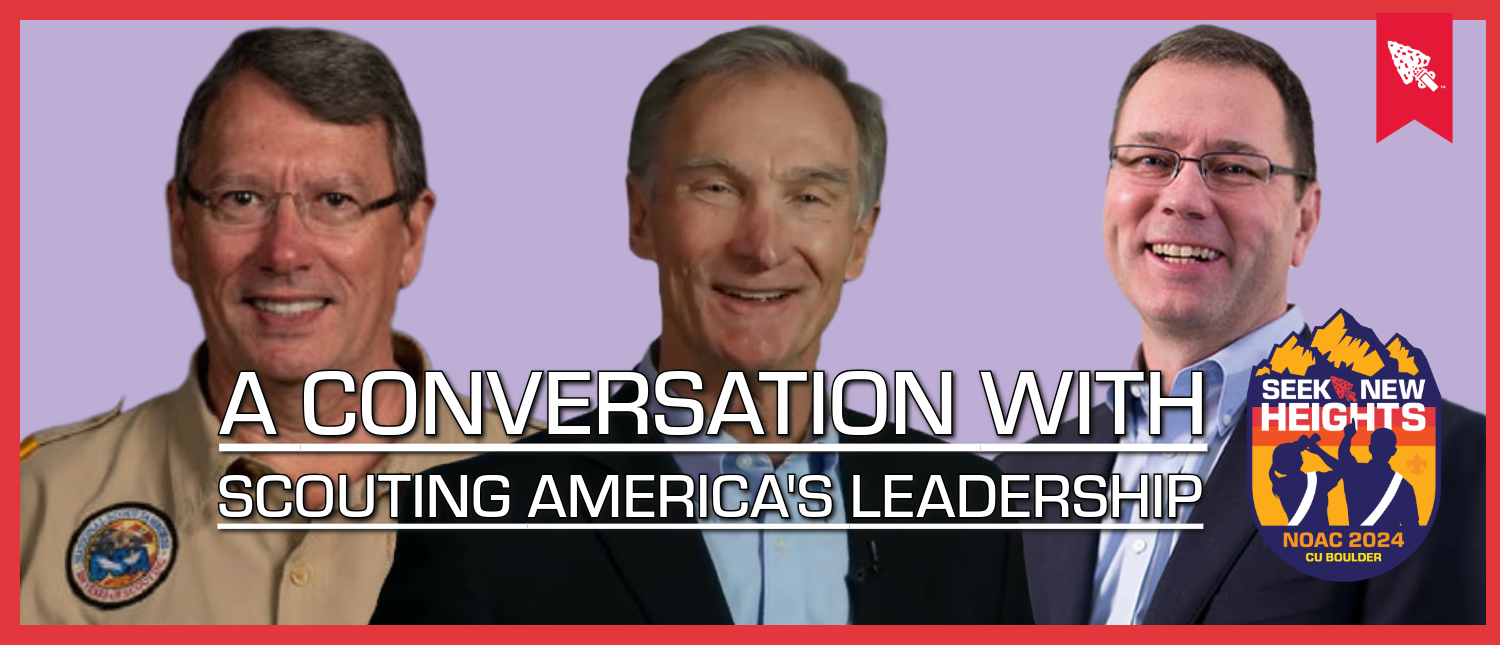The Order of the Arrow would not exist without Scouting America. Leading the vision and the future of Scouting America is the Key 3, composed of National Chair Brad Tilden, National Commissioner Scott Sorrels, and Chief Scout Executive Roger Krone. All three attended NOAC 2024 this week.
It was important for them to come to NOAC 2024 as they each recognized the Order of the Arrow as Scouting’s National Honor Society and its importance to Scouting America. “The organization was founded to recognize the best of the best,” shared Krone.
To this end, Krone encourages youth to make their mark on Scouting.
“Go back to the movement,” Krone urged. “Make the movement better.”
For adults, Krone said that the Order of the Arrow must play a role in growing Scouting.
“It’s important to make sure you are equipping Scouters to pay it forward and to go back to the units and help us grow the movement,” Krone explained.
Sorrels noted that the Order of the Arrow draws parallel to the Commissioner Service.
“We’re both service driven,” remarked Sorrels. “Cheerful service is part of the soul of the OA and our unit commissioners in particular, the way we’re trying to position them now, is to be the single best service for their unit leader.” Sorrels explained that the cheerful, service driven nature of the OA is incredibly similar to the goals of the Commissioner Service that he leads as National Commissioner, attempting to provide service to the units and to the councils the commissioners serve.
Each member of the Key 3 was personally impacted by Scouting as youth. Though they lived in different states, experiencing the program in different councils and different lodges, Scouting was able to benefit them all. Though the National Chair and National Commissioner are volunteers, and have careers separate from Scouting, the program still prepared them and gave them skills and values they kept through their lives.
“As my career progressed, the things I learned in Scouting meant more and more, and my life is way better because of what I learned in Scouting,” Tilden noted. “I think almost everyone that was in Scouting as a kid when they’re older and looks back says that’s a big part of their value system.”
Building on this, Scott Sorrels observed that Scouting becomes a part of your identity. “It’s in your blood,” Sorrels stated. “It’s who you are. The Scout Oath and Law are a way to live your life. There are 56 words between the Oath and Law and if you follow those and make them part of your soul, then that fundamentally does change your life and the impact you can have on the world.”
One of the most important lessons to take away from Scouting is a sense of perseverance. Whether it’s earning your Eagle Scout Rank, Summit Award, or Quartermaster Award, they are not easy to attain. Even if that’s not your goal, Scouting will challenge you throughout your time in the program. While it may feel easier to walk away, that’s not always the best solution. As Roger Krone noted, “If you’re struggling and you’re not getting out of Scouting what you want, try a different unit. Or if you’re in Scouts BSA, you could do Venturing or Exploring.”
Tilden reiterated this view. “Stick with it,” Tilden encouraged Scouts. “If there’s things about Scouting that you don’t like, make them better.”
Whether it’s the Order of the Arrow or older youth programs, skills or values, Scouting has something to offer to everybody. The benefits of Scouting affect us all, and that’s something to keep with you throughout your life.


